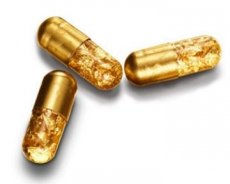Medical expert of the article
New publications
An effective drug against prostate cancer based on tea and gold has been created
Last reviewed: 01.07.2025

All iLive content is medically reviewed or fact checked to ensure as much factual accuracy as possible.
We have strict sourcing guidelines and only link to reputable media sites, academic research institutions and, whenever possible, medically peer reviewed studies. Note that the numbers in parentheses ([1], [2], etc.) are clickable links to these studies.
If you feel that any of our content is inaccurate, out-of-date, or otherwise questionable, please select it and press Ctrl + Enter.

American biologists have created a special drug based on tea extract and radioactive gold nanoparticles that quickly and safely destroys prostate cancer, and have successfully tested it on tumors implanted in the body of mice, according to an article published in the journal Proceedings of the National Academy of Sciences.
"During the study, we found that one of the components of tea attached itself to cancer cells inside the prostate. Then we "glued" these molecules to radioactive gold nanoparticles - tea helped them penetrate the cancer cells, which allowed them to quickly destroy the tumor," said the head of the team of scientists Kattesh Katti from the University of Missouri in Columbia (USA).
A group of biologists led by Katti conducted experiments with gold nanoparticles capable of destroying cancer cells using ionizing radiation. In the first stage of their work, the authors of the article selected the sizes of nanoparticles to combat adenocarcinoma - prostate cancer.

As scientists explain, the diameter of the nanoparticle directly affects its destructive ability - the larger the gold fragment, the more cells it will destroy. In the case of prostate cancer, such nanoparticles can damage not only cancer cells, but also healthy tissue, which can negatively affect the future of the man's offspring.
Katti and his colleagues conducted a series of experiments on adenocarcinoma cell cultures and concluded that particles of the radioactive isotope gold-198, several nanometers in diameter, would destroy even the most aggressive tumors.
Then the biologists began searching for an effective means of delivering the particles to the tumor. To their surprise, one of the components of tea - the antioxidant epigallocatechin gallate (EGCg) - was able not only to deliver gold particles to the tumor, but also to hold them close to the cancer cells. As the scientists explain, this substance is connected by a strong chemical bond to special outgrowths present only on the surface of adenocarcinoma cells.
The authors of the paper made a variety of gold nanoparticles and attached a variety of EGCg molecules to them. These particles successfully penetrated cancer cell cultures and destroyed them.
Convinced of the effectiveness of their invention, Katti and his colleagues tested it in action by attempting to destroy tumors made from adenocarcinoma cells implanted in the bodies of ordinary mice. According to the scientists, after a month of treatment, the cancerous growths either disappeared or were greatly reduced in size.
"Our next step is to collaborate with the College of Veterinary Medicine (at the University of Missouri) to experiment on larger animals in the near future and then move on to clinical trials with volunteers," concludes Katti.


 [
[